The media has been actively covering UNHCR’s recently released Annual Global Trends Report which highlighted the insane fact that worldwide displacement is at the highest level ever recorded. António Guterres, the U.N. High Commissioner for Refugees, said in the report that the world is entering an era “in which the scale of global forced displacement as well as the response required is now clearly dwarfing anything seen before.”
The numbers coming out of the report are staggering to say the least. Worldwide, one in every 122 people on the planet is now either a refugee, internally displaced or seeking asylum. 59.5 million people were forcibly displaced at the end of 2014 compared to 51.2 million a year earlier and 37.5 million a decade ago.
If this were the population of a country, it would be the 24th largest in the world.
The report said war, conflict and persecution were the primary causes for creating 14.4 million refugees last year, 2.7 million more people than 2013 and an almost 25 percent increase. This increase between 2013-2014 was the highest ever seen in a single year.
Half of the 60 million displaced are children. Don’t worry, that wasn’t a typo. That’s nearly 30 million children. How many of these children are in primary school? One in two. Only one in four is in secondary school. And university? Well, only 1%.
Yes these are indeed the numbers representing the world’s refugee crisis. They’re almost unfathomable in my opinion.
What does 60 million people even look like?
When you imagine 60 million displaced, does it look that different from 40 million or 20 million? The numbers are so large it can be difficult for some people to put that staggering “60 million people” into visual terms that can be fully understood.
So let’s try to put it into context. Imagine if every single English, Welsh, Scottish, and Irish person currently living on the British Isles were forced to flee their home. Or think about if every man, woman and child living in Italy suddenly were displaced. Alternatively, what if the populations of Saudi Arabia, the United Arab Emirates, Kuwait, Oman, Qatar and Bahrain were made to live elsewhere.
You could also think about these numbers in days, hours, or minutes.
In 2014, 42,500 new people were displaced every single day. That’s a new person forced to flee every other second.
It will take you about five minutes to read this article. In those five minutes 150 new people will have been force to flee their homes, leaving everything behind.
On #WorldRefugeeDay, I challenge you to think about what these numbers mean for the state of our world and what you can do as a fellow human being. Donate your time to the refugee cause, spread awareness of the crisis and share the stories of these ordinary people living in extraordinary times.
Here are 10 infographics from the 2014 Global Trends Report to help you visualize what the global displacement crisis really looks like.
1. 42,500 people were displaced everyday during 2014. This equates with every single person in a large city such as San Diego, USA or Brussels, Belgium being displaced every single month.
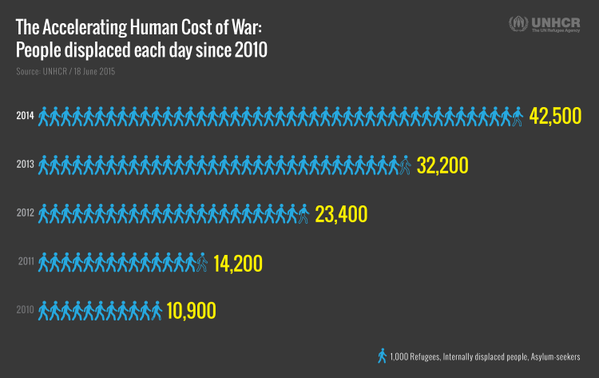
2. A mere 126,800 refugees were able to return home in 2014, the lowest number of returnees in 30 years.
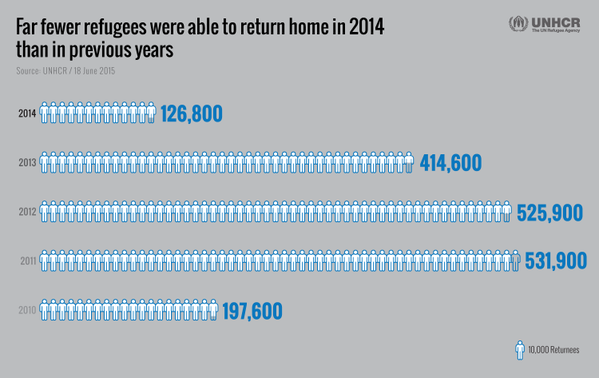
3. Nearly 12 million Syrians have been displaced. More than 7.6 million within Syria, and more than 4 million as refugees in neighboring countries.
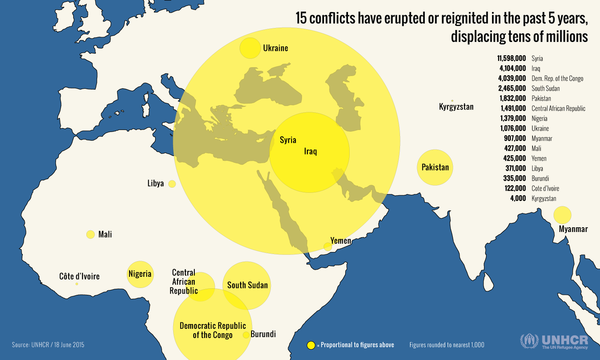
4. Lebanon hosted the largest number of refugees in relation to its national population where one in five people is a Syrian refugee. The equivalent per capita of the UK hosting nearly 13 million refugees.
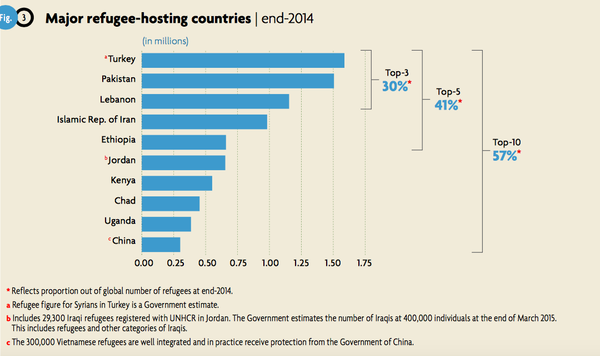
5. Colombia continues to have more than 6 million people who have fled their homes due to violence — the highest rate in the world after Syria.
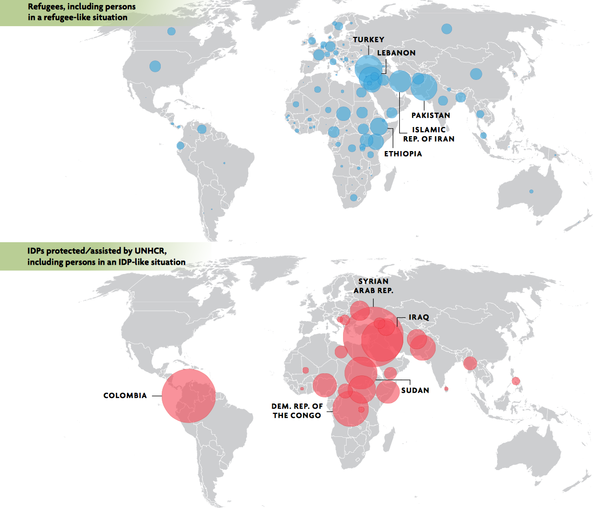
6. The numbers of people displaced by war are up 16% on 2013 – when the total stood at 51.2 million – and up 59% on a decade ago, when 37.5 million people were forced to flee their homes.
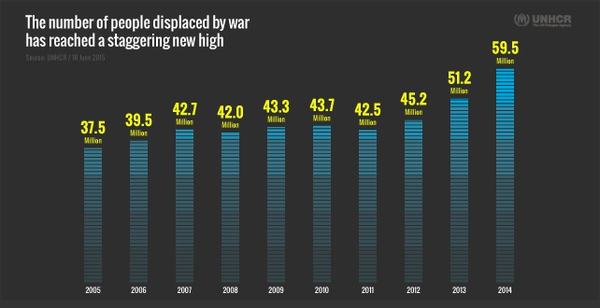
7. 53% of all refugees in 2014 came from Syria, Afghanistan and Somalia.
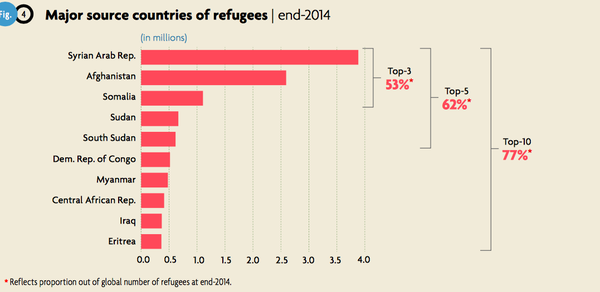
8. The 30 million children displaced by conflict are at risk of becoming a lost generation; with most largely uneducated.
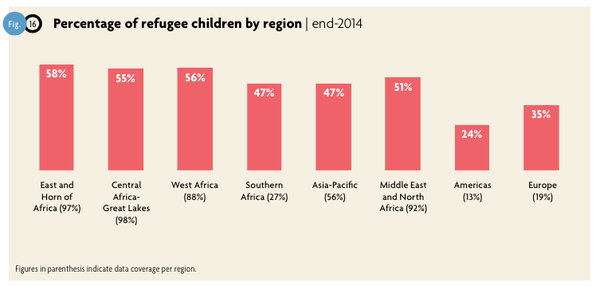
9. Those displaced by armed conflict, generalized violence, or human rights violations at the end of 2014 equate to be some 38.2 million. This is unprecedented since 1989, the first year for which global statistics on IDPs are available.
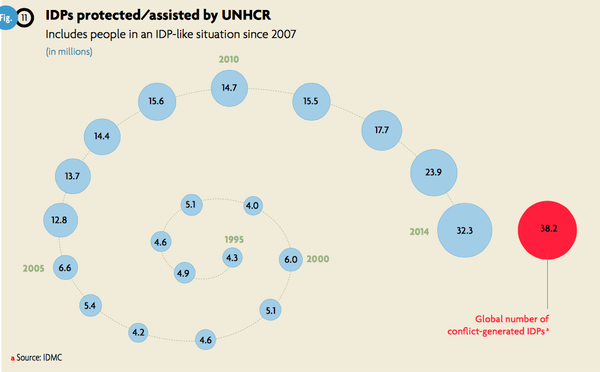
10. The average duration of the 33 protracted refugee situations at the end of 2014 is estimated to about 25 years.

Did we miss any great infographics floating around the web? Link us to them in the comments below and we’ll tweet them.
Photo credit: UNHCR / I. Prickett
If you’d like to repost this article on your website, please see our reposting policy.

